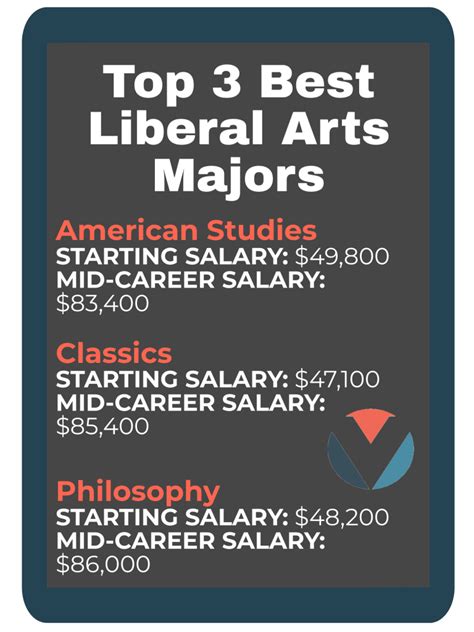A liberal arts education provides students with a broad foundation in the humanities, social sciences, and natural sciences. This well-rounded education prepares graduates for a wide range of careers in various industries.

Career Paths for Liberal Arts Graduates
According to the National Center for Education Statistics (NCES), liberal arts graduates have a median annual salary of $61,700, which is higher than the median salary for all bachelor’s degree holders ($59,120). Liberal arts graduates also have a higher employment rate (83%) than the average for all bachelor’s degree holders (80%).
Here are some common career paths for liberal arts graduates:
- Arts administration
- Business analyst
- Communications specialist
- Content writer
- Data analyst
- Education administrator
- Human resources manager
- Librarian
- Marketing manager
- Nonprofit program manager
- Policy analyst
- Public relations specialist
- Sales representative
- Software developer
- Technical writer
- Web designer
Skills and Knowledge Acquired through a Liberal Arts Education
Liberal arts graduates develop a variety of skills and knowledge that are highly valued by employers, including:
- Critical thinking: The ability to analyze information, identify arguments, and evaluate evidence.
- Communication skills: The ability to write clearly and effectively, speak persuasively, and listen attentively.
- Problem-solving skills: The ability to identify problems, develop solutions, and implement them.
- Research skills: The ability to gather information, organize it, and present it in a clear and concise manner.
- Teamwork skills: The ability to work effectively with others to achieve common goals.
Tips for Success with a Liberal Arts Degree
To increase your chances of success in your career, consider the following tips:
- Develop your skills: Focus on developing your critical thinking, communication, problem-solving, research, and teamwork skills.
- Gain experience: Internships, volunteering, and part-time jobs can help you gain valuable experience and build your resume.
- Network: Attend industry events, join professional organizations, and connect with people on LinkedIn.
- Be flexible: Be open to different career paths and industries. A liberal arts degree can prepare you for a wide range of opportunities.
Inspirations for Career Ideation
You can also use your liberal arts education as a foundation for exploring new and creative career opportunities. Here are some ideas to get you started:
- Become a social entrepreneur: Use your liberal arts skills to develop and implement solutions to social problems.
- Start a non-profit organization: Use your experience in the humanities to advocate for a cause you care about.
- Become a consultant: Use your critical thinking and problem-solving skills to help businesses and organizations improve their operations.
- Write a book: Share your knowledge and insights on a topic that you are passionate about.
- Start a podcast: Use your communication skills to share your thoughts and ideas with a wider audience.
Conclusion
A bachelor’s in liberal arts provides graduates with a strong foundation for a wide range of careers. By developing your skills and gaining experience, you can increase your chances of success. Don’t be afraid to explore new and creative career opportunities. With a liberal arts degree, you have the potential to make a positive impact in the world.
Frequently Asked Questions about Liberal Arts Careers
What is the average salary for a liberal arts graduate?
According to the NCES, the median annual salary for liberal arts graduates is $61,700.
What is the employment rate for liberal arts graduates?
According to the NCES, the employment rate for liberal arts graduates is 83%.
What are some common career paths for liberal arts graduates?
Common career paths for liberal arts graduates include arts administration, business analyst, communications specialist, content writer, data analyst, education administrator, human resources manager, librarian, marketing manager, nonprofit program manager, policy analyst, public relations specialist, sales representative, software developer, technical writer, and web designer.
What skills do liberal arts graduates develop?
Liberal arts graduates develop critical thinking, communication, problem-solving, research, and teamwork skills.
How can I increase my chances of success with a liberal arts degree?
To increase your chances of success, focus on developing your skills, gaining experience, networking, and being flexible.
Links to Relevant Resources
- The Complete Guide to Careers in Liberal Arts
- What Can You Do with a Liberal Arts Degree?
- The 10 Most Popular Liberal Arts Majors
